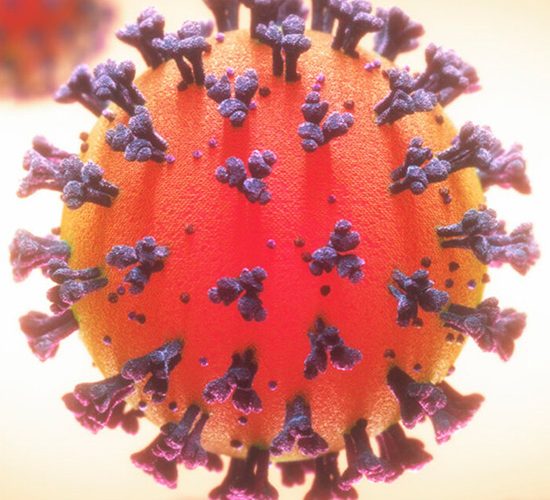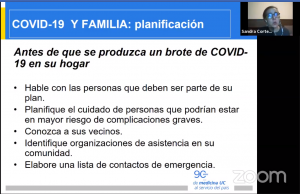TRANSMISSION and environmental control mechanisms of SARS-CoV-2: myths and realities with epidemiologist Sandra Cortés

Last Friday, May 15, Dr.. Sandra Cortés, PhD in Public Health. Pto Scholar. Faculty of Medicine of the Pontifical Catholic University of Chile, researcher at the Centre for advanced chronic diseases (ACCDIS) and the Sustainable Urban Development Center (CEDEUS), In addition, president of the Chilean Society of Epidemiology (SOCHEPI) participated in the ACCDIS seminar cycle on COVID-19, which takes place every Friday, through your social network Facebook.
In this opportunity, the public health expert discussed the transmission and environmental control mechanisms of SARS-CoV-2: myths and realities, referring to coronavirus as a very common virus among the biological systems of canines, Pigs, humans and bats.
He explained that there are several families of coronaviruses who have been present with us since before, which brings us the next question what caused this pandemic?, to this dr.. Sandra Cortés replied "the barrier between humans and other species broke", bat coronavirus jumped humans, producing what is known as zoonoses , a disease that passes from animals to humans and takes on certain characteristics in the new species.
He also added that, "thanks to technological advances, we know that the virus alters a specific protein that allows lung cells to enter and replicate in them".
During the seminar, Sandra Cortés reported on current coVID-19 case figures in Latin America, notably that by 1.000.000 inhabitants Chile is in number two with more confirmed cases. The first place is occupied by Peru, brazil and then more linearly are Bolivia, Uruguay and Argentina.
On the other hand, he also reported, according to the latest data from the Department of Epidemiology of the Ministry of Health, "in Chile this is a disease that is mainly concentrated in productively aged people", i.e. individuals who become infected generally range from 34 to 50 years old, "the more the age increases, the higher the odds of lethality," he added.
At this point the doctor emphasizes the importance of taking this factor into account, because it is the region of the population that generates the economic activity and development of a country.
As for the transmission mechanisms the scientist corroborated that the virus is transmitted by saliva, allowing us to use this element as a diagnostic tool, commented Cortés, who also added that another way to transmit the virus is through the faeces, which is an important finding, "because it puts us before a challenge, which has to do with environmental implications and preventive control measures in homes".
 It also reported that the virus is present on inanimate surfaces, i.e. elements or objects that we use frequently, for example "on a piece of paper, the virus can stay for up to 4 or 5 days, in a cotton swab for 5 minutes and in a plastic for 2 to 6 days, However, the permanence of the virus will depend on the temperature at which the object is exposed. In a plastic at a temperature of 21 degrees Celsius the virus can last up to two weeks," she said.
It also reported that the virus is present on inanimate surfaces, i.e. elements or objects that we use frequently, for example "on a piece of paper, the virus can stay for up to 4 or 5 days, in a cotton swab for 5 minutes and in a plastic for 2 to 6 days, However, the permanence of the virus will depend on the temperature at which the object is exposed. In a plastic at a temperature of 21 degrees Celsius the virus can last up to two weeks," she said.
In this line the epidemiologist makes a preventive call to disinfect the products that enter the houses, "let's take into account all the items we buy". It is of the utmost importance to disinfect with solutions containing alcohol, chlorine and/or oxygenated water.
Chile faces other pandemics
The Dra. Sandra Cortés took advantage of the space to signal the challenge for the country to face COVID-19 with other pandemics, "we live normally with chronic diseases such as diabetes, hypertension, obesity and sedentary lifestyles", this makes us consider that it is not enough to implement strategies for the control of the virus, but we also have to take into account the other diseases that suffer from a large part of the population.
To finish, the doctor indicated a number of recommendations to live with people who are suspected or confirmed cases of COVID-19:
- Any contact with the positive or suspicious person, do it with masks and gloves.
- Wash the sick person's dishes and utensils with gloves and hot water.
- Clean daily with water and disinfectant surfaces and frequent contact items.
- The basket of dirty laundry and clothes, should be handled with disposable gloves and then disinfect the basket.
- To remove trash bags and handle waste, wear gloves and wash your hands when you're done.
- Use a trash can with exclusive bags for sick person's items
- It's important to ventilate the house, including the sick man's room.
To this, Sandra Cortés added a thoughtful message about the resilience we must have to the pandemic, "we must accept that this crisis is a problem that we are going to overcome and that this coronavirus is part of our life, is installed in our ecosystem stock. And in the context of globalization we are very likely to continue to have new viruses", learning this crisis is to install organizational change in our homes, workplaces and in the country at large, the public health expert ended.
